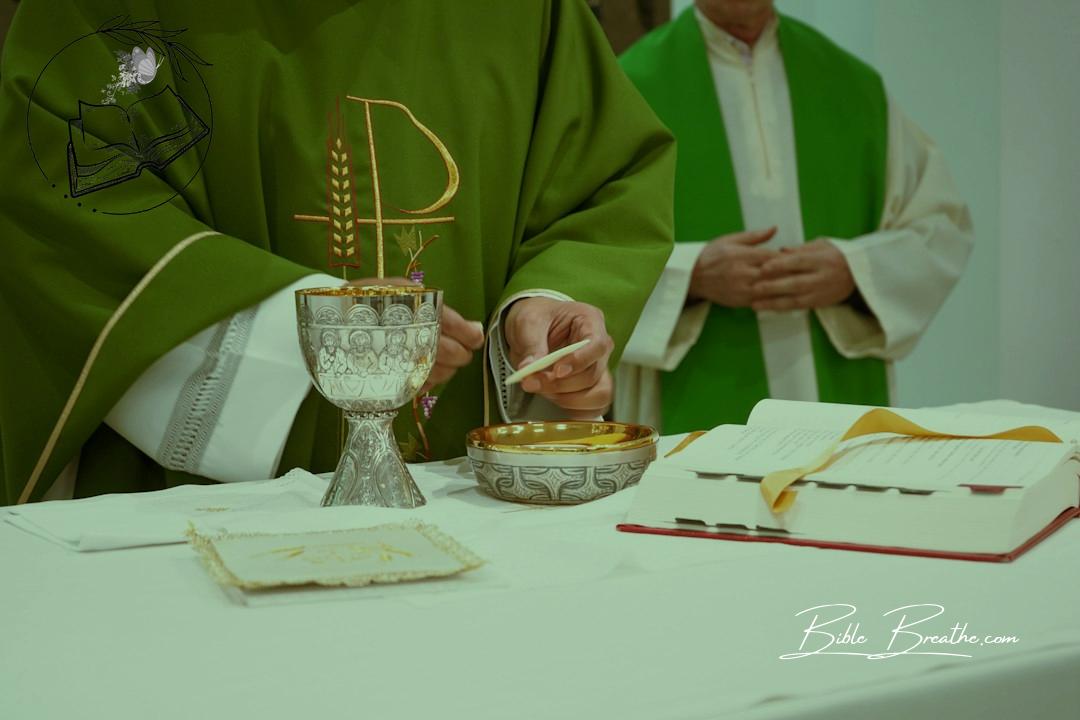What’s the deal with overseers in the Bible, fam?
You might be thinking, “Overseer?
That sounds like a movie villain.”
But hold up, it’s way more epic than that.
An overseer, or you can call them a bishop or an elder, they’re like the spiritual quarterbacks of the church team.
They bring that spiritual authority with a side of humility, like a seasoned captain leading their crew.
Picture this: They’re up in the pulpit, dropping wisdom bombs in their sermons that hit you right in the heart, keeping the faith fire burning bright.
They’re like the guardians of the faith playbook, making sure we’re all on the same page, living out that Gospel truth.
We’re about to dive deep into what makes these overseers tick, the scriptural qualifications, and how they’re like the keepers of the faith flame.
It’s all about understanding the heartbeat of the church, my friends.
🙌
Key Takeaways
- The role of an overseer in the Bible is significant within the context of the Christian church. Overseers, also known as elders or PASTORs, are responsible for the spiritual and PASTORal leadership of the local congregation.
- Adhering to biblical qualifications for overseers is crucial, as outlined in passages like 1 Timothy 3 and Titus 1. These qualifications include qualities such as moral integrity, sound doctrine, and a good reputation. These criteria are essential for the effective and godly leadership of the church.
- The Bible places a strong emphasis on servanthood and humility in leadership. Overseers are called to lead by example, serving the church and its members with love, humility, and a heart of dedication. They are not to lord their authority over others but to shepherd and care for the flock entrusted to them.
- The role of an overseer is a sacred calling, and those who serve in this capacity are expected to embody the character and teachings of Christ. They are to guide, teach, and protect the congregation, ensuring its spiritual growth and well-being.
Decoding the Captain of the Ship: What’s an Overseer in the Bible?
Photo modified by BibleBreathe.com. Original photo by JESHOOTS.COM on Unsplash
Ever find yourself pondering on what an overseer is in the Bible?
It’s like trying to figure out the main ingredient of your favorite dish, isn’t it?
In the biblical lingo, we often encounter terms like overseer, bishop, and elder, and it can be a bit like sorting through spices in the cupboard.
Let’s unpack this together, shall we?
Overseer, Bishop, and Elder: Different Names, Same Key Role
In the Bible, overseer, bishop, and elder are like the trinity of roles within the church.
Picture it like having three names for a remarkable flower in your garden—it’s still the same beautiful bloom.
But what’s their exact role?
Well, they all point to folks who play a vital part in guiding and steering the church community, just like a captain navigating a ship through life’s storms.
Lost in Translation: One Dish, Many Names
Here’s the twist: depending on the version of the Bible you’re reading, you might notice one of these terms more than the others.
It’s a bit like traveling and finding folks calling a dish by different names—it’s still the same savory delight, just a different title.
For instance, “overseer” might shine in some translations, while others spotlight “bishop” and “elder.” It’s like having different accents of the same language, but the core message remains unchanged.
Unveiling the Episcope: Let’s Speak Greek
Now, to really get into it, let’s venture into the roots of the word “episcope.” It’s like diving into the origins of a word in your home language.
“Episcope” is a Greek gem from which these titles stem.
It carries the idea of supervision or oversight.
Think of it like the watchful eye of a shepherd tending to their flock, making sure they’re on the right path.
In essence, whether you call them overseers, bishops, or elders, these are the spiritual captains of the church.
They’re entrusted with the care of the congregation, just as a shepherd cares for the flock.
The scriptures spell out their qualifications and responsibilities, emphasizing qualities like being a servant, having humility, and teaching spiritually.
This is a true saying, If a man desire the office of a bishop, he desireth a good work.” – 1 Timothy 3:1 (KJV)
So, there you have it—a peek into the lingo surrounding overseers in the Bible.
Whether you’re seeking spiritual guidance or just curious about the intricacies of biblical language, understanding these roles can be your compass as you navigate the sea of Christian leadership.
Navigating the Waters: The Essential Role of an Overseer in the Bible
Photo modified by BibleBreathe.com. Original photo by Rohan Gupta on Unsplash
Ever wondered about the term “overseer” in the Bible?
It might not be as popular as some biblical characters, but it’s like a hidden gem in the church’s leadership tapestry.
Let’s break it down and uncover the crucial role of an overseer, also known as a bishop, in the Holy Scriptures.
Unveiling the Church’s Leadership Squad
In this epic tale of church leadership, two significant figures take the spotlight: overseers and deacons.
They’re like the Batman and Robin of spiritual guidance, each with their own missions.
Picture overseers as the captains of the ship.
They’re the PASTORs and elders, steering the ship of the church through life’s storms, making sure everyone on board stays the course.
“If a man desires the office of a bishop, he’s aiming for a noble task.” – 1 Timothy 3:1 (KJV)
The Overseer’s Playbook
Zoom in, and let’s talk about what an overseer really does.
They’re not just figureheads; they’re spiritual shepherds, guiding, protecting, and nurturing the church members.
Think of them as the glue keeping the flock together, growing in faith, and following the Bible’s teachings.
Imagine a coach leading a sports team — that’s what overseers do spiritually.
They give guidance on faith, doctrine, and worship.
Their sermons from the pulpit are like pep talks, inspiring the congregation to live by the gospel and scripture.
Pay attention to yourselves and to the entire flock, over whom the Holy Spirit has appointed you overseers, to feed the church of God, which he bought with his own blood.” – Acts 20:28 (KJV)
The Right Stuff: Qualities of an Overseer
To be a great overseer, you need some essential qualities.
Things like humility, servanthood, and a deep understanding of spiritual teachings.
An overseer shouldn’t be seeking power or authority; instead, they should be driven by a genuine desire to serve the church and spread the faith.
Next time you stumble upon “overseer” in the Bible, see them as the dedicated spiritual leaders, the captains of the ship, steering the church through the journey of faith.
Remember, just like a ship needs a steady hand at the helm, a church relies on faithful overseers to navigate the spiritual waters.
⚓
The Sacred Call: What Defines an Overseer in the Bible
Photo modified by BibleBreathe.com. Original photo by James Balensiefen on Unsplash
When it comes to grasping the essence of an overseer in the Bible, it’s more than just titles and positions—it’s about the essence and qualities that shape these individuals.
It’s like gathering the right ingredients for a delicious meal—each one matters.
The Weight of Qualifications
You might wonder, “Why do qualifications matter so much for overseers?”
Well, think of it this way: just as you wouldn’t want an unqualified pilot steering your plane, you wouldn’t want an unqualified leader guiding your spiritual voyage.
Qualifications act as a blueprint, ensuring that those in these crucial roles are prepared for their sacred tasks.
Unveiling the Blueprint
Now, let’s dive into the nitty-gritty—the qualifications for an overseer, as laid out in the scriptures.
We turn to 1 Timothy 3:2–7 and Titus 1:6–9 as our guiding stars.
Above Reproach
First and foremost, an overseer must be above reproach.
This means they should have a spotless reputation, like a freshly laundered white robe.
Their character should stand as a shining example to the congregation.
Faithful Spouse
Just as a ship needs a sturdy anchor to stay steady, an overseer should be a faithful spouse.
Their marital relationship should epitomize commitment and devotion.
Temperate and Sober-Minded
Temperance is like the rudder of a ship, keeping it on course.
Overseers should exhibit self-control and clear thinking.
They should be level-headed in times of trial.
Respectable and Hospitable
Think of respectability as the welcome mat at the door.
An overseer should be hospitable, making everyone feel at home in the congregation.
Able to Teach
Imagine an overseer as a skilled musician, capable of teaching beautiful melodies.
They should be adept at teaching the Word, guiding others in their faith journey.
Not a Drunkard or Violent
Just as you wouldn’t want a captain who indulges in drinking and violence, an overseer should avoid such behaviors, maintaining a peaceful and sober demeanor.
Gentle and Not Quarrelsome
A gentle spirit is like a soothing balm to a wounded heart.
An overseer should be known for their gentleness and should avoid unnecessary quarrels.
Not a Lover of Money
Money can be a tempting siren, luring even the most steadfast.
An overseer should not be driven by wealth but should be content with what they have.
Manages His Household Well
Like a skilled ship captain managing their crew, an overseer should lead their household with wisdom and integrity.
Not a Recent Convert
Leadership isn’t for newcomers; it’s for those seasoned in faith.
An overseer should not be a recent convert but someone with a deep understanding of the Word.
Good Reputation with Outsiders
Just as a ship’s reputation precedes it in foreign ports, an overseer should have a good reputation even among those outside the church.
Holding Firm to the Word
Think of the Word as the North Star guiding the way.
An overseer should hold firmly to the teachings of the Bible, unwavering in their faith.
The Tapestry of Leadership
In conclusion, the qualifications for an overseer form a rich tapestry of character traits and virtues.
They are not just guidelines but a calling to serve with humility, love, and a steadfast commitment to God’s Word.
When these qualifications are met, the church congregation can trust that their spiritual journey is in capable hands.
“A bishop then must be blameless, the husband of one wife, vigilant, sober, of good behaviour, given to hospitality, apt to teach.” – 1 Timothy 3:2 (KJV)
“For a bishop must be blameless, as the steward of God; not selfwilled, not soon angry, not given to wine, no striker, not given to filthy lucre.” – Titus 1:7 (KJV)
So, when you think of an overseer in the Bible, remember that it’s not just a title; it’s a sacred calling that requires a heart devoted to God and His people.
Guiding the Flock: Embracing the Role of an Overseer in the Bible
Photo modified by BibleBreathe.com. Original photo by Lennon Caranzo on Unsplash
Ever set out on a journey and thought, “I need a guide”?
Someone who knows the ins and outs of the path, someone to steer you in the right direction.
Well, in the grand book we call the Bible, an overseer plays that guiding role within the church.
Picture them as the compass, steering God’s flock and upholding the vital principles of leadership and servanthood.
Shepherding the Flock
Picture a shepherd in a vast, open field, watching over the sheep.
The sheep depend on this shepherd for protection, sustenance, and guidance.
In a similar vein, an overseer in the Bible is entrusted with the care and guidance of the church congregation.
They’re the spiritual shepherds, making sure the members of the church are nourished by God’s word and shielded from spiritual harm.
Feed the flock of God which is among you, taking the oversight thereof, not by constraint, but willingly; not for filthy lucre, but of a ready mind.” – 1 Peter 5:2 (KJV)
The Shepherd After God’s Heart
Being an overseer isn’t about power and authority.
It’s about humility and servitude.
They’re called to be shepherds, mirroring the role of Jesus Christ, who referred to himself as the Good Shepherd.
Just as a shepherd knows each of his sheep by name, an overseer should have a personal and caring relationship with the members of the congregation.
This relationship goes beyond just PASTORal duties.
It’s about being a spiritual mentor and guide, helping individuals in their walk of faith, and ensuring they stay on the path of righteousness.
“I am the good shepherd, and know my sheep, and am known of mine.” – John 10:14 (KJV)
Biblical Leadership: A Heart of Service
In the Bible, leadership isn’t about being a boss; it’s about serving others with humility and love.
Overseers embody this principle by being examples of servanthood.
They lead by showing the way, teaching the congregation the essence of serving, faith, and living according to the gospel.
In a world where authority often means dominance, the biblical view of leadership reminds us that true leadership is found in servanthood and selflessness.
So, when you stumble upon the term “overseer” in the Bible, see it as a call to be a caring shepherd, steering and nurturing the spiritual well-being of the church with humility, love, and steadfast faith.
🌟
Nurturing the Flock: Women and the Overseer’s Role in the Bible
Photo modified by BibleBreathe.com. Original photo by Memento Media on Unsplash
As we embark on a journey to understand the essence of an overseer in the Bible, we must shed light on a topic that has stirred discussions and debates—the eligibility of women for this leadership role.
Let’s venture into this intricate subject and grasp why, based on biblical references, the role of overseer has historically been seen as reserved for men.
Anchoring in the Scriptures
To fathom this matter, we must turn to the scriptures, our guiding compass for matters of faith and practice.
Several passages in the Bible shed light on the male leadership role within the church.
1. 1 Timothy 2:12 (KJV)
“But I suffer not a woman to teach, nor to usurp authority over the man, but to be in silence.”
This verse has often been cited as a reference supporting male leadership within the church.
It suggests that women should refrain from teaching roles that involve exercising authority over men.
2. 1 Corinthians 14:34–35 (KJV)
“Let your women keep silence in the churches: for it is not permitted unto them to speak; but they are commanded to be under obedience as also saith the law. And if they will learn any thing, let them ask their husbands at home: for it is a shame for women to speak in the church.”
This passage emphasizes the importance of women maintaining silence in the church and seeking knowledge through their husbands at home.
Understanding the Overseer’s Role
Now, let’s apply these biblical principles to the role of an overseer.
An overseer, like a shepherd guiding the flock, carries a significant spiritual responsibility within the congregation.
They are expected to teach, lead, and provide spiritual guidance to the church.
Given the scriptural directives we’ve discussed, the traditional interpretation is that the overseer position is reserved for men.
This perspective is based on the belief that men are ordained to assume leadership roles within the church, while women are encouraged to serve in other valuable capacities.
A Rich Tapestry of Service
It’s vital to note that this scriptural interpretation does not diminish the vital role of women within the church.
Women have played and continue to play crucial roles in various ministries, teaching, and serving the congregation in numerous ways.
The Bible is replete with stories of remarkable women who were faithful and influential in their service to God.
In essence, while the role of overseer is traditionally seen as male-specific due to scriptural passages, it’s part of a larger tapestry of service where both men and women contribute to the growth and well-being of the church.
“There is neither Jew nor Greek, there is neither bond nor free, there is neither male nor female: for ye are all one in Christ Jesus.” – Galatians 3:28 (KJV)
In conclusion, when pondering the role of an overseer in the Bible and the question of gender, it’s essential to approach the topic with respect for different interpretations and a recognition of the valuable contributions both men and women make to the church’s mission.
Walking in the Footprints of Jesus: Grasping the Heart of an Overseer in the Bible
Photo modified by BibleBreathe.com. Original photo by Miquel Parera on Unsplash
In the intricate design of biblical leadership, the role of an overseer stands out as a beacon of humility and servanthood.
To truly understand the depth of this role, one must see the profound connection between these virtues and the example set by Jesus himself.
Embracing Humility and Servanthood
An overseer’s heart needs to be adorned with the jewels of humility and servanthood.
Imagine a leader who doesn’t strive for the limelight but rather humbly serves their congregation, much like a wise and caring mentor.
Humility in leadership is like a gentle stream, consistently nourishing the spiritual growth of others without drawing attention to itself.
“For whosoever exalteth himself shall be abased, and he that humbleth himself shall be exalted.” – Luke 14:11 (KJV)
Servanthood is the cornerstone of an overseer’s role.
They don’t use authority to command; they use it to compassionately guide and support.
It’s akin to a dedicated teacher empowering their students, helping them find their own path to wisdom and understanding.
The Jesus Model of Leadership
When we talk about leadership and servanthood, there’s no greater exemplar than Jesus himself.
He, who could have claimed all authority, chose instead to wash the feet of his disciples, a profound act of humility and servitude.
In doing so, he left an indelible mark on what it means to be a leader in God’s kingdom.
“For even the Son of man came not to be ministered unto, but to minister, and to give his life a ransom for many.” – Mark 10:45 (KJV)
An overseer, walking the path Jesus walked, doesn’t lead with an iron fist but with a gentle hand, guiding the congregation towards spiritual growth.
They see their role not as a position of power but as a sacred duty to care for the souls entrusted to them.
So, when you come across the term “overseer” in the Bible, realize it beckons us to mirror the humble and servile heart of Jesus, to lead with love, and to serve with unwavering devotion.
By doing so, overseers carry on the timeless tradition of nurturing the faith of God’s people.
🌟
Frequently Asked Questions (FAQs) About What Is An Overseer In The Bible
Is an overseer the same as a bishop or elder?
In some Christian traditions, an overseer is equivalent to a bishop or elder.
These terms can vary depending on the denomination.
They generally refer to a leader responsible for the spiritual guidance and oversight of a local church.
Why are only men allowed to be overseers in the church?
This practice is based on certain biblical interpretations.
In 1 Timothy 2:12-13, it’s suggested that men should lead the church.
However, views on this vary among denominations, with some allowing women in leadership roles, emphasizing equality and interpretation differences.
What are the primary responsibilities of an overseer?
An overseer, as described in the Bible, holds various responsibilities.
These include leading, teaching, guarding the church’s doctrine, managing, and setting an example for the congregation.
They oversee the spiritual growth and well-being of the members, ensuring the community follows God’s teachings.







